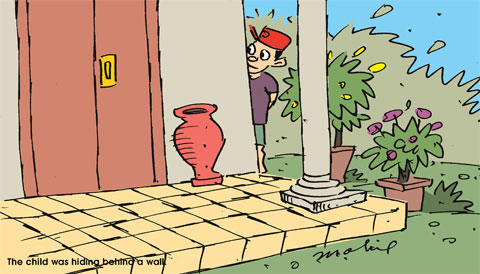|

by R. S. Karunaratne
Use of prepositions
Behind
If somebody or something is behind you, they are near your back
rather than front.
When I was small I used to walk behind my father.

Behind the cupboard there were some cobwebs.
The child was hiding behind a wall.
The officer behind the desk gave me a form.
The driver behind me began hooting.
If you shut a door behind you, you shut it after going through it.
The man entered a big room and shut the door behind him.
If you are behind something, you caused it.
He was the driving force behind the project.
If somebody is behind you, he supports you.
I am not afraid because my supporters are behind me.
If you refer to what is behind somebody’s outward appearance, you are
referring to their hidden characteristics.
Behind his innocent look, he has a nasty temper.
If you are behind somebody, you are less successful.
Rex has fallen behind the rest of the class.
If you refer to an experience behind you, it is in your past.
He already has one examination failure behind him.
If you are behind schedule, you have not advanced as planned.
When we attended the lecture we were well behind schedule.
Opposite
If one thing is opposite another, it is on the other side of it.
There is a river opposite my house.
If an actor stars with another in a film or play, the former plays
opposite the latter.
Malini Fonseka played opposite Gamini Fonseka in many Sinhala films.
Upon
‘Upon” is similar to ‘on’ but it is more formal. If an event is upon
you, it has just started affecting you.
Now that the rainy season is upon us, we may run short of vegetables.
Via
If you go via a particular place, you go through it on the way to
another place.
We returned to London via Moscow.
If you do something via a particular means, you do it by making use of
that means.
Today you can send letters via email.
Prior to
If something happens prior to a particular event, it happens before
that event.
The author read the manuscript several times prior to publication.
Note: Prior to is a formal expression.
Quiz on idioms
Idioms are one of the most interesting parts of the English language,
especially when you are learning it. In the following quiz we give you
the first part of the idiom in column ‘A.’ Find the other part from
column ‘B’ and check your answers with the key.
[Column A]
1. Absence makes ...
2. Cut your coat ...
3. There’s no accounting ...
4. Great oaks ...
5. Actions speak ...
6. Close the stable door ...
7. You’re banging your head ...
8. Great minds ...
9. All good things ...
10. All roads ...
11. All work and no play ...
12. All’s fair ...
13. The grass is ...
14. One man’s loss is ...
15. There’s one law for the rich ...
16. Any publicity ...
17. An apple a day ...
18. As ye sow ...
19. While the cat’s away ...
20. Throw the baby ...
21. You scratch my back ...
22. A bad workman ...
23. If you can’t beat ‘em ...
24. Beauty is in the ...
25. Beauty is only ...
[Column B]
A. skin deep
B. eye of the beholder
C. join ‘em
D. blames his tools
E. and I’ll scratch yours
F. out with the bath-water
G. the mice will play
H. so shall ye reap
I. keeps the doctor away
J. the heart grow fonder
K. according to your cloth
L. for taste
M. from little acorns grow
N. louder than words
O. after the horse has bolted
P. against a brick wall
Q. think alike
R. must come to an end
S. lead to Rome
T. makes Jack a dull boy
U. in love and war
V. greener on the other side of the fence
W. another man’s gain
X. and another for the poor
Y. is good publicity
Key:
1. Absence makes the heart grow fonder.
2. Cut your coat according to your cloth.
3. There’s no accounting for taste.
4. Great oaks from little acorns grow.
5. Actions speak louder than words.
6. Close the stable door after the horse has bolted.
7. You’re banging your head against a brick wall.
8. Great minds think alike.
9. All good things must come to an end.
10. All roads lead to Rome.
11. All work and no play makes Jack a dull boy.
12. All’s fair in love and war.
13. The grass is greener on the other side of the fence.
14. One man’s loss is another man’s gain.
15. There’s one law for the rich and another for the poor.
16. Any publicity is good publicity.
17. An apple a day keeps the doctor away.
18. As ye sow so shall ye reap.
19. While the cat’s away, the mice will play.
20. Throw the baby out with the bath water.
21. You scratch my back and I’ll scratch yours.
22. A bad workman blames his tools.
23. If you can’t beat ’em, join ’em.
24. Beauty is in the eye of the beholder.
25. Beauty is only skin deep.
Starters :
Present Continuous
[Tense]
We can use the present continuous tense to refer to new habits or
repeated actions which happen around the time of speaking or writing.
Nilma is saving every cent to put up a new house.
The children are staying up late tonight to watch an interesting film on
television.

Grandmother is using her husband’s spectacles because she has lost her
pair.
We are electing a new chairman for our club next week.
Hema is skipping her dinner to reduce her weight.
We use the present continuous tense to refer to temporary situations.
I’m riding my father’s motorcycle until mine is repaired.
She is waiting for the bus because her car met with an accident.
The workers are demanding that the company pays compensation for
making them redundant.
Sam is looking for new lodgings as he has to move out of his house in
a week’s time.
Ken is working as a cleaner until he gets a better job.
We use the present continuous tense to refer to planned future actions.
We are joining them on their next pilgrimage to India.
The students’ union is holding a meeting with the university council
next Monday.
Please wait; we’re leaving in ten minutes.
The trishaw is coming to pick me up.
Our flight to Australia is taking off at 9.30 p.m.
We use the present continuous tense to refer to actions happening at
the time of speaking or writing.
Mother is boiling water to prepare tea.
The chef is cooking fish for lunch.
We’re living in a house overlooking the lagoon.
A variety of interesting birds is living in the wet zone.
You’ve kept me waiting for more than two hours!
[Activity]
Underline the correct verb in the following sentences. Check your
answers with the key.
1.The cat meowed / was meowing from 5 a.m. until dawn.
2. our air-conditioner was not working / did not work for more than two
hours.
3. Barbara got / was getting a beautiful suntan; then a heavy rain
began.
4. the policeman was trying to open / tried to open the car door when
my father started to explain what happened.
5. The beggar was so angry that he pulled / was pulling his hair out!
6. The baby was falling / fell asleep when I pick him up.
7. Mary is usually drinking / usually drinks her coffee with milk.
8. The last train to Kandy leaves / is leaving at 9.50 p.m.
9. I apply / am applying butter on bread.
10. Joe works / is working in the sales department.
[Key]
1. was meowing 2. was not working 3. was getting 4. was trying to
open 5. was pulling 6. was falling 7. usually drinks 8. leaves 9. apply
10. works
Current
English usage
Incorrect use of words can transform what you say or write into
garbage and gobbledegook. Conversely, the ability to communicate with
clarity, elegance and vivacity is little short of magic. But like all
magic it has to be practised and this comes down to using words
correctly. Be familiar with the following words and how they are used in
speech and writing.

1. AIDS / HIV
AIDS is the acronym for Acquired Immune Deficiency Syndrome.
It is a medical condition, not a disease. HIV is Human
Immunodeficiency Virus. It is also not a disease but a medical
condition. People who are HIV - positive may die from AIDS - related
diseases.
2. Akimbo is an adjective that describes the position of a person’s
arms. When a man stands arms akimbo, his arms are bent at the elbows and
he keeps his hands on his hips.
3. Alibi / excuse
An “alibi” is the defence that an accused person could not have
committed a crime because he was elsewhere at the time. An “excuse” is
an explanation to cover some fault or shortcoming. An alibi is not a
synonym for excuse.
4. Allege is a formal verb meaning “to state that somebody has done
something illegal or wrong without giving proof.” The accused alleged
that the police forced him to make a false confession.
5. Allegory / fable / myth / parable / legend
An “allegory” is a play or poem in which the characters symbolise a
deep moral message. A “fable” is a short story with a moral involving
animals as characters. Aesop’s Fables is a popular book. Originally, a
“myth” used gods and superhuman characters to explain natural phenomena.
However, today it is used to describe a baseless popular belief. A
“parable” is a short simple story which teaches or explains a moral or
religious idea. The Bible has many parables. A “legend” is a traditional
story thought to be true. The advent of Vijaya is a popular legend.
6. Allergy / aversion
An “allergy” is an over-sensitive reaction by the body to some
substance. It is not a synonym for “aversion” which means a dislike.
Some people have an aversion for hard work.
7. All ready / already
“All ready” means “prepared and ready for some proposed action.”
“Already” vaguely expresses or emphasises a time relationship.
8. All right / alright
“All right” means “satisfactory or reasonably good.” I wouldn’t say
Joe is fabulously rich, but he is doing all right. It also means “only
just good enough.” The film was all right, nothing special. “All right”
can also mean “safe.” Did you return home all right last night?
“Alright” is an informal word meaning “all right.” Some grammarians
consider that”alright” should not be used in formal writing.
9. Allude / elude / elide
“Allude” is a formal word meaning “to mention somebody or something
without talking about them directly.” When he mentioned that he had some
trouble at home, I guessed he was alluding to his son. If something
“eludes” you, you do not succeed in getting it. “Elide” in phonetics
means to “leave out the sound of part of a word when you pronounce it.
The “t” in “often” is often elided.
10. Alsatian / German Shepherd
“Alsatian” is a large dog, often trained to help the police or to
guard buildings. “German Shepherd” is used in the United States. |



